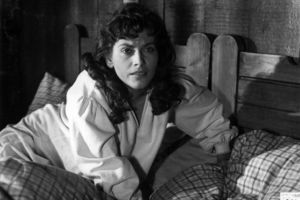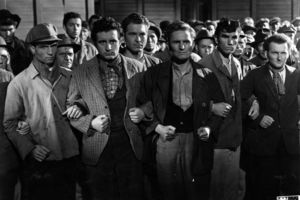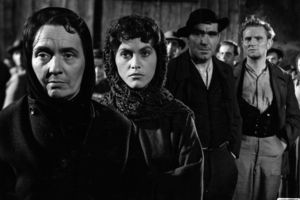Simplon-Tunnel
Director: Gottfried Kolditz, 90 Min., Black-White, Feature Film
Deutsche Demokratische Republik (DDR)
DEFA-Studio für Spielfilme, 1959
- Film/Video Format
- 35 mm
- Length in m
- 2458
- English Title
- Simplon - Tunnel
- Premiere Date
- Release Date (for Cinema)
- Literary Source
- Erzählung des italienischen Autorenkollektivs: Lizzani, Carlo; de Negri, Giuliani; Pratolini, Vasco; Socrate, Mario; Solinas, Franco
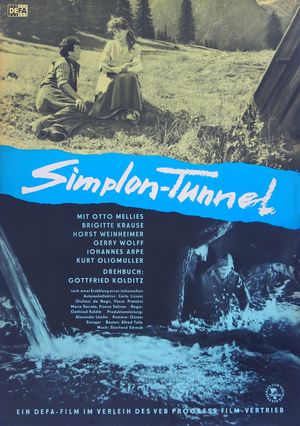
(Dir.: Gottfried Kolditz, 1959)
Short Summary (English)
A sociohistorical drama about the construction of the Simplon-tunnel: A conflict develops when German workers want to strike and fight for better working conditions while Italian workers simply want to earn money and provide for their families. Erich, a German who has been accused of spreading socialist propaganda, wants to start a union. Antonio, an Italian who secretly loves Erich's girlfriend Rosa, reveals the plans to the police. After the fact, Antonio realizes that Erich may have been the best leader for the workers, and regrets what he has done. Erich is sent to jail and Rosa, not believing that Erich will return, marries Antonio. Suddenly and unexpectedly, Erich returns, raising tensions between Rosa und Antonio. Unexpected flooding in the tunnel and the resulting work stoppage causes a famine among the workers. With a dangerous controlled explosion, Erich and Antonio manage finally to drain the water. The tunnel is then completed and Erich and Antonio are able to reconcile their differences.
(Source: catalogue "Cinefest - Internationales Festival des deutschen Film-Erbes", 2010)
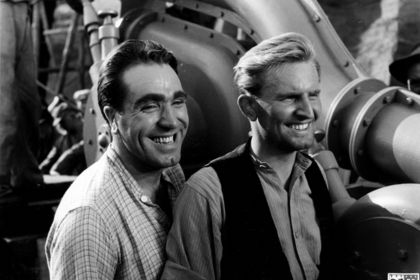
(Dir.: Gottfried Kolditz, 1959) Photography: Herbert Kroiss
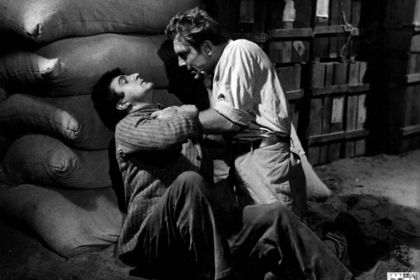
(Dir.: Gottfried Kolditz, 1959) Photography: Herbert Kroiss
Film Crew
- Director
- Script
- Camera
-
- Günter Eisinger
- Film Editing
-
- Hildegard Tegener
- Cast
-
- Otto Mellies (Erich)
- Brigitte Krause (Rosa)
- Horst Weinheimer (Antonio)
- Gerry Wolff (Salvatore)
- Johannes Arpe (Ingenieur Karl)
- Kurt Oligmüller (Tassoni)
- Elfriede Florin (Assunta)
- Hans Finohr (Pietro)
- Christine Lechle (Giulia)
- Christine Schwarze (Yvonne)
- Rolf Ripperger (Rudolf)
- Paul Lewitt (Poquelin)
- William Adelt (Schulze)
- Wolf Beneckendorff (Präsident)
- Klaus Bamberg (Italienischer Kürassier)
- Karl Block (Mechanikermeister)
- Michael Calmen (Adjutant)
- Otto-Erich Edenharter (Carlo)
- Hans Flössel (Alter Hans)
- Hans Fiebrandt (Geologe)
- Paul Funk (Polizeiunteroffizier)
- Georg Irmer (Victor Emanuel)
- Wolfgang Kalweit (Deutscher Arbeiter)
- Hans-Ulrich Lauffer (Journalist)
- Jochen Thomas (Ernesto)
- Edith Volkmann (Ingenieurin)
- Maria Wendt (Alte Frau)
- Albert Zahn (Fuhrmann)
- Maria Dressler (Kind von Salvatore)
- Thomas Dressler (Kind von Salvatore)
- Fredy Barten (Mitglied des Verwaltungsrates)
- Georg Dücker (Mitglied des Verwaltungsrates)
- Gustav Stähnisch (Mitglied des Verwaltungsrates)
- Otto Zedler (Mitglied des Verwaltungsrates)
- Hans Feldner (Mitglied des Verwaltungsrates)
- Victor Keune (Mitglied des Verwaltungsrates)
- Assistant Director
-
- Ursula Pohle
- Hans-Jürgen Brandt
- Assistant Camera
-
- Helmut Grewald
- Manfred Romboy
- Production Design
-
- Alfred Tolle
- Script Editing
-
- Willi Brückner
- Music
-
- Eberhard Schmidt
- Sound
-
- Karl Tramburg
- Costume Design
-
- Hans Kieselbach
- Make-Up
-
- Gerda Behrendt
- Lothar Hiller
- Props
-
- Erich Düring
- Production Management
-
- Alexander Lösche
- Unit Production Management
-
- Erich Kühne
- Paul Lasinski
- Bruno Schlicht
- DEFA Photography
-
- Herbert Kroiss
Short Summary (German)
Zu Beginn des 20. Jahrhunderts sind die Arbeiten am Simplon-Tunnel, der durch den Monte Leone eine Eisenbahnverbindung zwischen der Schweiz und Italien ermöglichen soll, in vollem Gange. Die harte Arbeit unter unmenschlichen Bedingungen teilen sich Schweizer, Franzosen, Italiener und Deutsche. Vor allem zwischen Letzteren kommt im Kampf um das größere Stück Brot Hass auf. Der Deutsche Erich und der Italiener Antonio rivalisieren außerdem noch um das Mädchen Rosa. In einer lebensgefährlichen Situation im Stollen begraben sie endlich ihre Feindschaft. Bei dem barbarischen Kampf mit den Naturgewalten rücken die Arbeiter unterschiedlicher Nationalitäten zusammen und ringen den Unternehmern Zugeständnisse ab.
(Quelle: Das zweite Leben der Filmstadt Babelsberg. DEFA-Spielfilme 1946-1992)
Short Summary (Other Languages)
Agli inizi del XX secolo, svizzeri, francesi, italiani e tedeschi sono impegnati nella costruzione della galleria ferroviaria scavata sotto il Monte Leone, che collegherà l'Italia con la Svizzera. Il tedesco Erich rivaleggia con l'italiano Antonio, anche per conquistare il cuore della bella Rosa. Bloccati entrambi in un cunicolo, in una situazione rischiosa per la vita, decidono di mettere da parte l'inimicizia per aiutarsi a vicenda. Nella disperata lotta contro le forze della natura, gli operai di diverse nazionalità lottano uniti, ottenendo anche delle concessioni da parte dell'azienda. (Italienisch)

